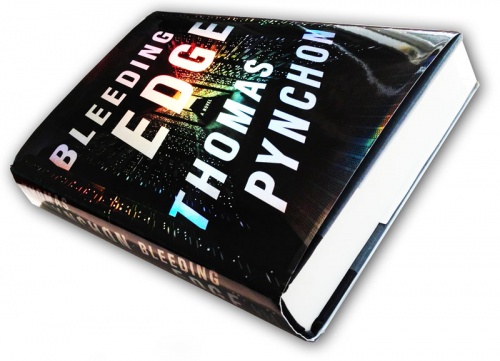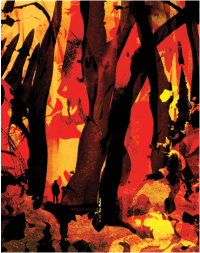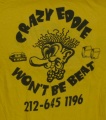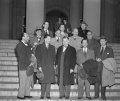Difference between revisions of "Main Page"
(→Featured Articles) |
(→Featured Articles) |
||
| Line 39: | Line 39: | ||
==Featured Articles== | ==Featured Articles== | ||
| − | [[File:Michael-Chabon.jpg|thumb|left|200px|Photo: ''The East Bay Monthly'']]'''Wow! writer Michael Chabon delivers a wonderful, insightful review of ''Bleeding Edge''.''' Chabon's a long-time appreciator of Pynchon and his perspective on the work is unsurpassed: "One ought to be accustomed, by now, to Pynchon’s leaving his mysteries unresolved, or at least prepared to give him credit for having done so on purpose. Incompleteness is the inherent vice of paranoid theories of history, the limitation of such theories that Pynchon has always freely acknowledged. Criticism of Pynchon’s “shaggy dog” or sloppy plotting neglects the emphasis that he has always laid on the dual meaning of the word ''plot''. From ''V.'' forward, nearly all his novels have been founded on a bedrock of detective fiction and underlayed with science fiction, boy’s adventure, westerns, spy fiction, and other genres that rely, like conspiracy theories, on plotting. His broken plots expose the epistemological brokenness of paranoid systems, which are, after all, nothing but attempts, grander but no less doomed to failure than anyone’s, to make sense of a broken world." [http://www.nybooks.com/articles/archives/2013/nov/07/thomas-pynchon-crying-september-11/ Full article »] | + | [[File:Michael-Chabon.jpg|thumb|left|200px|Michael Chabon - Photo: ''The East Bay Monthly'']]'''Wow! writer Michael Chabon delivers a wonderful, insightful review of ''Bleeding Edge''.''' Chabon's a long-time appreciator of Pynchon and his perspective on the work is unsurpassed: "One ought to be accustomed, by now, to Pynchon’s leaving his mysteries unresolved, or at least prepared to give him credit for having done so on purpose. Incompleteness is the inherent vice of paranoid theories of history, the limitation of such theories that Pynchon has always freely acknowledged. Criticism of Pynchon’s “shaggy dog” or sloppy plotting neglects the emphasis that he has always laid on the dual meaning of the word ''plot''. From ''V.'' forward, nearly all his novels have been founded on a bedrock of detective fiction and underlayed with science fiction, boy’s adventure, westerns, spy fiction, and other genres that rely, like conspiracy theories, on plotting. His broken plots expose the epistemological brokenness of paranoid systems, which are, after all, nothing but attempts, grander but no less doomed to failure than anyone’s, to make sense of a broken world." [http://www.nybooks.com/articles/archives/2013/nov/07/thomas-pynchon-crying-september-11/ Full article »] |
<p style="clear:both"></p> | <p style="clear:both"></p> | ||
Revision as of 11:59, 30 October 2013
Welcome to the Bleeding Edge Wiki!To become a contributor/editor, Create an account.
- Order Bleeding Edge (Amazon)
- Check out some Featured Articles
- Songs mentioned in Bleeding Edge
- Penguin Press's trailer for Bleeding Edge
This is the Wiki for Thomas Pynchon's Bleeding Edge. Besides using the Alphabetical Index and the page-by-page annotation, you can also take a look at Bleeding Edge cover analyses, read the reviews, or entertain some theories on the source of the title.
Contents
How to Use this Wiki
There are two major ways to use this wiki. The first is the Bleeding Edge Alphabetical Index, used to keep track of the myriad characters, real and imagined, as well as events, arcana, and lots of other stuff. The second is the Spoiler-Free Annotations by Page, which allows the reader to look up and contribute allusions and references while reading the book, in a convenient and spoiler-free manner.
Apart from those, it's up to you.
Bleeding Edge Alpha Guide to Characters, Places & More
Page by Page Annotations
| Chapter 1 pp. 1-7 |
Chapter 2 pp. 8-19 |
Chapter 3 pp. 20-29 |
Chapter 4 pp. 30-40 |
Chapter 5 pp. 41-52 |
| Chapter 6 pp. 53-67 |
Chapter 7 pp. 68-79 |
Chapter 8 pp. 80-86 |
Chapter 9 pp. 87-95 |
Chapter 10 pp. 96-111 |
| Chapter 11 pp. 112-120 |
Chapter 12 pp. 121-133 |
Chapter 13 pp. 134-144 |
Chapter 14 pp. 145-159 |
Chapter 15 pp. 160-171 |
| Chapter 16 pp. 172-184 |
Chapter 17 pp. 185-197 |
Chapter 18 pp. 198-210 |
Chapter 19 pp. 211-218 |
Chapter 20 pp. 219-229 |
| Chapter 21 pp. 230-238 |
Chapter 22 pp. 239-246 |
Chapter 23 pp. 247-255 |
Chapter 24 pp. 256-264 |
Chapter 25 pp. 265-273 |
| Chapter 26 pp. 274-287 |
Chapter 27 pp. 288-300 |
Chapter 28 pp. 301-313 |
Chapter 29 pp. 314-326 |
Chapter 30 pp. 327-337 |
| Chapter 31 pp. 338-346 |
Chapter 32 pp. 347-353 |
Chapter 33 pp. 354-364 |
Chapter 34 pp. 365-382 |
Chapter 35 pp. 383-394 |
| Chapter 36 pp. 395-407 |
Chapter 37 pp. 408-422 |
Chapter 38 pp. 423-438 |
Chapter 39 pp. 439-447 |
Chapter 40 pp. 448-462 |
| Chapter 41 pp. 463-477 |
Featured Articles
Wow! writer Michael Chabon delivers a wonderful, insightful review of Bleeding Edge. Chabon's a long-time appreciator of Pynchon and his perspective on the work is unsurpassed: "One ought to be accustomed, by now, to Pynchon’s leaving his mysteries unresolved, or at least prepared to give him credit for having done so on purpose. Incompleteness is the inherent vice of paranoid theories of history, the limitation of such theories that Pynchon has always freely acknowledged. Criticism of Pynchon’s “shaggy dog” or sloppy plotting neglects the emphasis that he has always laid on the dual meaning of the word plot. From V. forward, nearly all his novels have been founded on a bedrock of detective fiction and underlayed with science fiction, boy’s adventure, westerns, spy fiction, and other genres that rely, like conspiracy theories, on plotting. His broken plots expose the epistemological brokenness of paranoid systems, which are, after all, nothing but attempts, grander but no less doomed to failure than anyone’s, to make sense of a broken world." Full article » An exellent Harper's Magazine article that combines a review of Bleeding Edge with detailed biographical and genealogical info on Mr. Pynchon, and a Must Read!: "Bleeding Edge, however, offers an indication that Pynchon has finally given up on seeking the soul of the nation his family helped found. For Pynchon — the embattled bard of the counterculture, disabused of all allegiance — the last redoubt has become the family, and the last war to be waged is between our virtual identities and the bonds of blood; a war to keep the Virtual from corrupting the Blood, if not forever, then for time enough to let the lil’ Ziggy and Otis Tarnow-Loefflers of this world live with the merest pretense of freedom (childhood). Pynchon understands that in the future there will be no secrets, no hidden complots — everything will be aired and any second life, whether in the cloud or in the firmament, will be despoiled or denied us. Adult sanity, then, must depend not on the lives we make online, but on the lives we make off it — our kids — on how we love them, and how we raise them, and the virtues and good-taste imperatives we pass on to them from our progenitors." Full article » Jonathan Lethem's review of Bleeding Edge for The New York Times, may be the most intelligent and insightful review of them all. Lethem gets it! "[There is] the sheer vitality and fascination, the plummets into beauty and horror, the unique flashes of galactic epiphany, in Pynchon’s method. Our reward for surrendering expectations that a novel should gather in clarity, rather than disperse into molecules, isn’t anomie but delight. Pynchon himself’s a good companion, full of real affection for his people and places, even as he lampoons them for suffering the postmodern condition of being only partly real. He spoils us with descriptive flights." Read the review... Noticing that New York Times critic Michiko Kakutani has panned every Pynchon novel after Mason & Dixon (1997) — the latest target being Bleeding Edge — I became curious as to just who this grumpy critic is. If you're curious too, read "Assessing Michiko Kakutani":"Kakutani doesn't offer the stylistic flair, the wit, or the insight one gets from Kael and other first-rate critics; for her, the verdict is the only thing. One has the sense of her deciding roughly at Page 2 whether or not a book is worthy; reading the rest of it to gather evidence for her case; spending some quality time with the Thesaurus; and then taking a large blunt hammer and pounding the message home." Read on...
Bleeding Edge Review by David Kipen, for Publishers Weekly, is a well written and insightful appreciation of Pynchon's craft and his new novel! "No one, but no one, rivals Pynchon's range of language, his elasticity of syntax, his signature mix of dirty jokes, dread and shining decency." Read the review...Pynchon Wiki Help and Contributor Guidelines
Click here for help with editing and creating pages.
We have a few conventions we ask that you follow:
- When creating a new page, first check to make sure a page/article about what you want to write about hasn't already been created, by checking the list of all Wiki pages on this Bleeding Edge Wiki. If a page already exists, please modify that one.
- When creating a new page, if its information pertains to one (and only one) specific Pynchon novel, please categorize it with the appropriate identifier. For example, a page pertaining to Bleeding Edge, should use the syntax
[[Category:BE]].
- To open a discussion on an individual listing of the Alpha Index, create one using the entry on Peter Tait as an example. Basically, give it a name that identifies the alpha listing (eg [[Name Discussion|DISCUSSION]]) and notice that the visible name will be "DISCUSSION" in full caps, so it stands out a bit.
External Links
- Latest news on Thomas Pynchon (Google News)
- ThomasPynchon.com
- The Modern Word Pynchon page
- Pynchonoid Blog
- Wikipedia Bleeding Edge page
- Literarywiki.org - wiki annotations to works by Pynchon, Umberto Eco, and many others.
Image Gallery
Below are some of the images you will find on Pynchon Wiki.HangingMan-Tarot.jpg
WikiAdmin
14:54, 3 November 2016
26 KB
Dilbert-Dogbert-TechSu...
WikiAdmin
16:14, 29 December 2014
61 KB
Dr Zizmor Subway Ad.jpeg
Mikefallopian
21:45, 17 April 2014
0 B
Gurie-Marco-Polo.jpg
WikiAdmin
11:57, 1 March 2014
35 KB
Oland-Charlie-Chan.jpg
WikiAdmin
13:12, 28 February 2014
21 KB
Sondegaard-The-Letter.jpg
WikiAdmin
13:12, 28 February 2014
27 KB
Mao-bank.jpg
WikiAdmin
11:28, 28 February 2014
16 KB
Netscape-gray.jpg
WikiAdmin
11:32, 17 January 2014
9 KB
Example.jpg
Greenlantern
10:22, 15 January 2014
61 KB
Klaatu-Equation-Blackb...
WikiAdmin
08:21, 10 January 2014
82 KB
Jaffe-Earth-Stood-Stil...
WikiAdmin
08:02, 10 January 2014
82 KB
Vegeta.jpg
WikiAdmin
18:00, 6 January 2014
108 KB
Vegeta.gif
WikiAdmin
17:57, 6 January 2014
72 KB
Goomba.PNG
WikiAdmin
10:39, 16 December 2013
126 KB
Sam-Jackson-Kangol.jpg
WikiAdmin
07:10, 9 November 2013
25 KB
Dunce-cap.jpg
WikiAdmin
22:15, 3 November 2013
109 KB
Galactic-Empire-Stormt...
WikiAdmin
18:21, 30 October 2013
231 KB
Michael-Chabon.jpg
WikiAdmin
11:53, 30 October 2013
31 KB
Harpers-Review-Pembert...
WikiAdmin
09:43, 30 October 2013
399 KB
Shelley-Faberes-Evil.jpg
WikiAdmin
08:45, 17 October 2013
93 KB
Susansontag.jpg
Benvolio
06:22, 4 October 2013
55 KB
ZiL-41047.jpg
Greenlantern
19:04, 24 September 2013
40 KB
Vontz Center.jpg
Greenlantern
11:12, 24 September 2013
83 KB
Bombing of presidentia...
Greenlantern
10:21, 24 September 2013
123 KB
Perl-Camel2.jpg
Benvolio
06:55, 21 September 2013
0 B
Perl-Camel.jpg
Benvolio
06:54, 21 September 2013
124 KB
Omar-owl-clock.jpg
Chiclitz
12:32, 19 September 2013
29 KB
SonyVX2000.jpg
Benvolio
07:38, 17 September 2013
20 KB
Crazyeddieshirt.jpg
Benvolio
02:34, 17 September 2013
33 KB
Callerypear.jpg
Benvolio
01:45, 17 September 2013
291 KB
Telegraph-Review.jpg
WikiAdmin
09:54, 15 September 2013
87 KB
Michiko-Kakutani.jpg
WikiAdmin
14:10, 14 September 2013
17 KB
Welcome-to-the-johnson...
WikiAdmin
12:27, 14 September 2013
218 KB
Donitz-Hitler.jpg
WikiAdmin
11:32, 14 September 2013
68 KB
Lethem-BleedingEdge.jpg
WikiAdmin
07:53, 13 September 2013
0 B
Server-Farm-At-Night s...
WikiAdmin
07:32, 11 September 2013
73 KB
BE-Final-Cover.jpg
WikiAdmin
17:01, 9 September 2013
86 KB
Cheongsam.jpg
WikiAdmin
06:02, 8 September 2013
98 KB
Pynchon-simpsons.jpg
WikiAdmin
14:51, 7 September 2013
43 KB
Hollywood-ten.jpg
WikiAdmin
07:18, 7 September 2013
54 KB
BE-book-lg.jpg
WikiAdmin
07:40, 5 September 2013
65 KB
PubWeekly-logo.png
WikiAdmin
07:35, 4 September 2013
15 KB
Thanks, and enjoy...













































